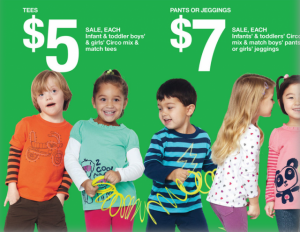 Last week, Target very subtly and without comment included a little boy with Down Syndrome among its models in one of its weekly ads. The scene shows 5 happy kids happily playing in their Target-purchased clothes. It’s so subtle that you might miss it if you weren’t paying attention, but one of those kids just happens to have Down Syndrome.
Last week, Target very subtly and without comment included a little boy with Down Syndrome among its models in one of its weekly ads. The scene shows 5 happy kids happily playing in their Target-purchased clothes. It’s so subtle that you might miss it if you weren’t paying attention, but one of those kids just happens to have Down Syndrome.
This was brought to my attention through a link on Facebook to a blog post by Noah’s Dad. Noah is a little boy with Down Syndrome and his dad is blogging to tell his story. It’s clear that that story is full of some challenges, but also lots of joy.
Noah’s parents learned of their son’s special condition just after his birth, but we all know that many, many parents get this news when their child is in utero and opt not to face the challenges and joys of a child with Down Syndrome. In fact, as Noah’s Dad tells their story, he tells about a strange encounter with his wife’s OB/GYN the morning after Noah’s birth. The doctor says, “I’m so sorry. I went home last night and looked over everything to see if I somehow missed something.” It seems the implication is that she might have missed something that would have let them know early enough that they could have chosen to terminate the pregnancy. (Noah’s dad notes that he was thinking, among other things, “Even if you ‘missed’ something it wouldn’t have changed anything. We love this baby so much!”) The doctor also offered to prescribe anti-depressants to help his wife deal with the situation. Noah’s dad tells this story partly to make the larger point that, although many, many, people were very “un-positive” about Noah, he and his wife want to shout from the rooftops that Down Syndrome is okay, that having a child with Down Syndrome is about as joyful as … well, having a child.
It seems to me that part of what it means to build a culture of life is to tell the stories like the story of Noah’s family: a child with special needs is just like any child, bringing to a family a mix of challenges and joys, opportunities to give and receive love. Frankly, even those committed to choice in such situations ought to acknowledge that the more stories out there about the fullness of what the choice to raise a child with special needs can mean, the better equipped parents will be to make a good choice. Or, at least, perhaps we can lessen the temptation to give into the fears of the impossibility of the task of parenting such children. There are obviously special challenges that come along with special needs, but we (as Church, as society) can make those challenges easier or harder on the persons, families, and communities who bear them most directly by our messages of inclusion and exclusion, of what counts as normal or not, of what counts as a life worth living, of what counts as a birth (and a child) worth celebrating.
I think Noah is a child worth celebrating, as is the little boy in the orange shirt in the Target ad. As are children with all kinds of special needs. Thanks to all the parents who witness that, and witness TO that, daily. You are building a culture of life, of joy. You are building a world where every person has dignity and value.

